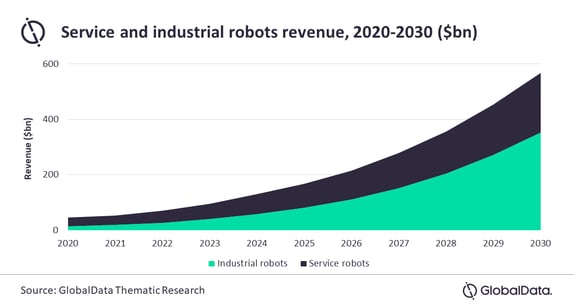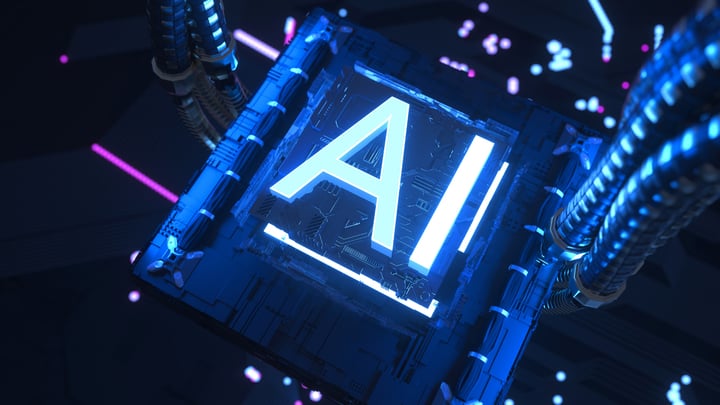In this article for Field Service News, Ryan Condon, Head of Content at Comparesoft, discusses how Artificial Intelligence is changing field service management.
ARCHIVE FOR THE ‘artificial-intelligence’ CATEGORY
Dec 22, 2021 • Features • Artificial intelligence • Digital Transformation • field service management • ryan condon
In this article for Field Service News, Ryan Condon, Head of Content at Comparesoft, discusses how Artificial Intelligence is changing field service management.
Artificial Intelligence (AI) was something we imagined would transform our lives in the future. But, since it’s now a part of our everyday lives, field service managers and technicians should get up to speed on how AI is changing Field Service Management (FSM) for the better.When most customers say that speed of service is the main motivator for customer service—as many as 80% of Americans according to PWC—it’s good to know that AI has the ability to speed up the delivery of off-site services.
In essence, AI is when machines simulate or mimic human intelligence. It’s a broad, catch-all term that includes subsets such as machine learning and deep learning. All of which aim to enhance and add to human interaction with positive effect.
The traditional model for the field service industry was to once assess, diagnose, and then resolve failed equipment or machinery. But since the advent of AI devices, and the distancing measures taken to address the impact of the pandemic, AI has given way to a transformation of these standard practices.
Today, by predicting when problems may arise before they occur, or estimating when machinery will need repair, AI technology is speeding up field service delivery and, with it, customer satisfaction.
AI devices include a broad range of software and hardware. Much of AI falls into the category of Internet of Things (IoT) or, in other words, devices that are disrupting field service management in very positive ways.
For instance, utilities company Thames Water are using sensors and real-time analytics to forecast asset failures. This is helping them move faster in situations that demand it, such as unexpected storms or water leakages.
Plus, there’s US firm Aquant’s AI-driven Remote Triage. Thanks to decision-making AI, this system is supporting an increase in first-time fix rates. By offering its users a range of possible solutions to problems, it asks questions about the symptoms of each piece of faulty equipment and helps technicians get a head-start before they’ve reached the site.
By reducing the length of response time to urgent matters, AI is improving all aspects of delivery – from communication to scheduling and customer service. And, according to 80% of industry experts, these efficiencies are boosting employees’ morale and their skill sets.
How AI is Used by Field Service Companies
The use of AI in field service management has grown in recent years. Here are some of the ways it’s supporting improvements in the field and making delivery faster:
Job Scheduling and Dispatching
By using intelligent technology to analyse various data sets, AI programs use specific algorithms to determine whether future jobs are likely to be successful or not. This is helping service technicians to achieve higher first-time fix rates than before.
Where it used to be incumbent on dispatchers to ask customers the right questions before technicians arrived on-site, this predictive technology is freeing up dispatchers’ time for more visits while reducing repeat visits.
Automated scheduling, via AI programs, is also changing the way schedulers handle their workload. By giving them the time back to focus on more difficult cases, real-time AI scheduling is managing those easy, quick win scheduling jobs while letting staff focus their time on what matters. Equally, AI technology is overcoming problems with repeat or inappropriate bookings by prioritising jobs according to data held on technicians’ skillsets, locations, and availability.
Predictive Maintenance and Management
AI Management Software is helping field service companies take a proactive approach to addressing field service needs. By using a wide range of data, AI enables more accurate forecasting. This is preventing potential failures, errors, and interruptions to field service. It’s also driving productivity through a reduction in errors.
AI technology is able to optimise route management in real-time, which is particularly helpful during emergencies. So, if there is heavy traffic, for example, a technician can decide whether they’d be able to get to a site or otherwise find an alternative or nearby technician who could help address the issue in time.
By addressing unplanned or unforeseen circumstances before they happen, field service companies are better able to address problems and reduce negative cost implications from any disruptions or interruptions to service.
Computer Vision AI
Computer Vision is where AI algorithms process, analyse, and make sense of visual data such as images or videos. They do this in the same way as humans, basing their complex assessments on pattern recognition.
So, when it comes to technician’s seeking additional expertise on specific areas of a job—where they may not know themselves—Computer Vision AI can interpret the technician’s problems and provide solutions based on the images it sees. So, how does this work in practice?
Stage 1: Technicians use their smartphones to take pictures, having followed instructions on the app
Stage 2: Neural AI networks process the image by detecting specific aspects and acknowledging the issue
Stage 3: The system sends back information to technicians relating to the issue
Stage 4: Technicians resolve the issue and send back the new images
Stage 5: Once the photo is clear of all issues, AI confirms the job is complete
Guidance Through a Knowledge Base
Having an up-to-date knowledge base is a great way to provide field technicians with the additional tools and information they need to ‘self-help’ when problem-solving issues.
But there will be times when they either can’t find the information they need or don’t know where to look for it. This is where AI comes in – to aid field service technicians with finding the solutions they’re looking for.
Using technology such as Natural Language Processing, AI enables a computer to understand the full meaning and intention of any written or spoken language. By summarising bigger amounts of text, AI is helping technicians get the information much faster than they would have.
Areas Of Field Service Management That AI Can Improve
While AI has been embraced by the industry in recent years, there are many ways it can help management teams to make significant and lasting improvements to service delivery.
Customer Experience
Keeping customers and clients happy is the essence of field service management. So, it’s good news that AI can help. With fewer opportunities for in-person interactions due to the Covid-19 pandemic, companies can keep customer communication more consistent with AI-driven communication channels.
24/7 helpdesks are possible with the help of AI-supported chatbots. Because, when customers need support, chatbots can be there at any time of the day. They can assist with general queries, or even with helping the customer navigate the knowledge base.
Self-service portals are also an excellent way to keep the customer in control. Self-service allows customers to register problems, upload photos of the issue or schedule maintenance jobs themselves. This will not only speed up maintenance but will keep customers satisfied.
Job Prioritisation and Optimisation
The beauty of AI and machine learning technologies is that they can handle the jobs that we don’t want to do. For example, by prioritising based on a range of factors such as location, type of machinery, skill levels, customer needs, and any KPI’s, customers are more likely to get the service they expect. This also makes sure technicians and dispatchers’ optimise their time.
Intelligent AI systems can also scan service requests and generate priority lists for customer tickets. By analysing data and gleaning insights on historical activity, intelligent AI is efficient in handling the management of scheduling and dispatch of technicians.
Accuracy and Efficiency
Most field service teams are doing everything they can to reduce the potential for human error and improve accuracy. But, in reality, staff teams have much to handle and need all the help they can get.
Using a predictive and proactive approach to maintenance, AI has the ability to make radical changes to levels of service efficiency. Through the infrastructure of IoT devices that track and monitor progress with precision, AI makes the work of field service technicians much easier by notifying them of necessary repairs and well in advance of when problems are likely to occur.
Also, with intelligent scheduling, AI enables technicians to arrive at a job based on the priorities of the business. Or, whichever factors are most important. With any changes to scheduling managed in real-time, AI-powered intelligent dispatching and inventory management ensures technicians have the right information and tools to have a better chance of meeting their first-time fix rates.
Further Reading:
- Read more about Digital Transformation @ www.fieldservicenews.com/digital-transformation
- Read more about Artificial Intelligence @ www.fieldservicenews.com/artificial-intelligence
- Read more about Field Service Manegement @ www.fieldservicenews.com/field-service-management
- Connect with Ryan Condon on LinkedIn @ www.linkedin.com/ryan-condon/
- Learn more about Comparesoft @ comparesoft.com
Dec 15, 2021 • News • Artificial intelligence • Automation • Ericsson • Telecommunications • EMEA • VONAGE
Ericsson (NASDAQ: ERIC) has entered into an agreement to acquire Vonage Holdings Corp. (NASDAQ: VG) for USD 21 per share. This represents a total acquisition price of approximately USD 6.2 billion (Enterprise Value).
Ericsson (NASDAQ: ERIC) has entered into an agreement to acquire Vonage Holdings Corp. (NASDAQ: VG) for USD 21 per share. This represents a total acquisition price of approximately USD 6.2 billion (Enterprise Value).
The merger agreement was approved unanimously by the Board of Vonage. The transaction builds upon Ericsson’s stated intent to expand globally in wireless enterprise, offering existing customers an increased share of a market valued at USD 700 billion by 2030.
THE ACQUISITION UNDERLINES ERICSSON STRATEGY TO EXPAND ITS PRESENCE IN WIRELESS ENTERPRISE AND BROADEN ITS GLOBAL OFFERINGS
Börje Ekholm, President and CEO of Ericsson, says: “The core of our strategy is to build leading mobile networks through technology leadership. This provides the foundation to build an enterprise business. The acquisition of Vonage is the next step in delivering on that strategic priority. Vonage gives us a platform to help our customers monetize the investments in the network, benefitting developers and businesses. Imagine putting the power and capabilities of 5G, the biggest global innovation platform, at the fingertips of developers. Then back it with Vonage’s advanced capabilities, in a world of 8 billion connected devices. Today we are making that possible.”
“Today Network APIs are an established market for messaging, voice and video, but with a significant potential to capitalise on new 4G and 5G capabilities. Vonage’s strong developer ecosystem will get access to 4G and 5G network APIs, exposed in a simple and globally unified way. This will allow them to develop new innovative global offerings. Communication Service Providers will be able to better monetize their investments in network infrastructure by creating new API driven revenues. Finally, businesses will benefit from the 5G performance, impacting operational performance, and share in new value coming from applications on top of the network.”
Rory Read, CEO of Vonage, says: “Ericsson and Vonage have a shared ambition to accelerate our long-term growth strategy. The convergence of the internet, mobility, the cloud and powerful 5G networks are forming the digital transformation and intelligent communications wave, which is driving a secular change in the way businesses operate. The combination of our two companies offers exciting opportunities for customers, partners, developers and team members to capture this next wave.”
“We believe joining Ericsson is in the best interests of our shareholders and is a testament to Vonage’s leadership position in business cloud communications, our innovative product portfolio, and outstanding team.”
For Ericsson, the acquisition builds on the success of the integration of Cradlepoint in September 2020. Cradlepoint has continued to develop strongly under Ericsson’s ownership.
Vonage and the Vonage Communications Platform (VCP)Vonage, a global provider of cloud-based communications, has a strong track record of growth and margin evolution. Sales were USD 1.4 billion in the 12-month period to 30 September 2021, and over the same period, Vonage delivered an adjusted EBITDA margin of 14% and free cash flow of USD 109 million.
The cloud-based Vonage Communications Platform (VCP) serves over 120,000 customers and more than one million registered developers globally. The API (Application Programming Interface) platform within VCP allows developers to embed high quality communications - including messaging, voice and video - into applications and products, without back-end infrastructure or interfaces. Vonage also provides Unified Communications as a Service (UCaaS) and Contact Center as a Service (CCaaS) solutions as part of the Vonage Communications Platform.
VCP accounts for approximately 80% of Vonage’s current revenues and delivered revenue growth in excess of 20% in the three-year period to 2020, with adjusted EBITDA margins moving from -19% in 2018 to break-even in the 12-month period to 30 September 2021. Vonage’s management team projects annual growth of over 20% for VCP in the coming years.
Ericsson and Vonage – creating a winning combination
Vonage’s presence in the Communication Platform as a Service (CPaaS) segment will provide Ericsson with an opportunity to access a complementary, substantial and high growth segment. With increasing investments in 4G and 5G - and a flourishing ecosystem of new applications and use cases leveraging the power of modern networks - demand from enterprises for programmable networks has been accelerating. CPaaS technologies democratize network access by offering API enabled communications services. The CPaaS market is expected to reach USD 22 billion by 2025, growing at 30% annually. In addition, Ericsson’s global leadership in 5G technology is expected to provide access to the developing space for open network APIs, which is expected to reach at least USD 8 billion by the end of the decade with a strong growth profile. CSP customers will also benefit from monetizing their network investments, optimizing the user experience and stimulating additional growth opportunities with new and advanced global network APIs and access to Vonage’s unified communications and contact center solutions.
The combination of Vonage’s customer base and developer community and Ericsson’s deep network expertise, 26,000 R&D specialists and global reach create opportunities to accelerate standalone strategies and innovation in the market. This includes accelerating enterprise digitalization and developing advanced APIs made possible by 5G; putting the power of the wireless network and communications at the finger-tips of the developer. Such APIs can be applied to help ensure the quality of critical services like telemedicine, immersive virtual education and autonomous vehicles as well as experiential performance benefits in gaming, augmented and extended reality, over wireless.
In the longer term, Ericsson intends to offer value benefits to the full ecosystem – telecom operators, developers, and businesses – by creating a global platform for open network innovation, built on Ericsson and Vonage’s complementary solutions.
Overview of the transaction
The acquisition will be conducted by means of a merger agreement through which Ericsson will acquire all of Vonage’s outstanding shares at an all-cash price of USD 21 per share. The merger consideration represents a premium of 28% to Vonage’s closing share price on 19 November 2021 of USD 16.37 per share, and a premium of 34% to the volume-weighted average share price over the 3 months to 19 November 2021 of USD 15.71 per share.
The acquisition will be financed through Ericsson’s existing cash resources, which amounted to SEK 88 billion as of 30 September 2021 on a gross basis, and SEK 56 billion on a net basis as of the same date.
The transaction is expected to deliver near-term revenue synergy opportunities, including white-labelling and cross-selling of the combined product portfolio estimated to contribute USD 0.4 billion. by 2025. Ericsson also expects to achieve some cost efficiencies following completion of the transaction.
The transaction is expected to be accretive to EPS (excluding non-cash amortization impacts) and free cash flow before M&A from 2024 onwards.
On completion, Vonage will become a wholly owned subsidiary of Ericsson and will continue to operate under its existing name. It will be reported as a separate segment in Ericsson accounts. Vonage is headquartered in Holmdel, New Jersey in the United States with 2,200 employees throughout the United States, EMEA and APAC. Vonage’s employees will remain with the company and the Vonage CEO Rory Read will join the Executive Team of Ericsson, reporting to CEO, Börje Ekholm. Read joined Vonage as CEO in July 2020. With more than three decades’ global technology industry experience, Read was previously Chief Operating Executive for Dell Technologies and before that, CEO of Advanced Micro Devices (AMD).
Ericsson remains fully committed to previously communicated financial targets, including long-term EBITA margins of 15-18%; long term FCF before M&A of 9-12% of sales; and a 2022 target EBIT margin of 12-14% for Ericsson Group excluding Vonage.
Completion of the transaction is subject to Vonage shareholder approval, regulatory approvals and other customary conditions and is expected within the first half of 2022.
Further Reading:
- Read more about Digital Transformation @ www.fieldservicenews.com/digital-transformation
- Read more about Ericsson on Field Service News @ www.fieldservicenews.com/ericsson
- Read more about Telecommunications on FSN @ www.fieldservicenews.com/telecommunications
- Find out more about Ericsson @ www.ericsson.com
- Learn more about Vonage @ www.vonage.co.uk
- Follow Ericsson on Twitter @ twitter.com/Ericsson
Nov 24, 2021 • News • Artificial intelligence • Automation • Ericsson • Telecommunications • EMEA
Ericsson (NASDAQ: ERIC) is launching its Intelligent Automation Platform, a service management and orchestration product which enables any mobile network to be intelligently automated.
Ericsson (NASDAQ: ERIC) is launching its Intelligent Automation Platform, a service management and orchestration product which enables any mobile network to be intelligently automated.
Building on existing offerings, including cloud native dual-mode 5G Core and the Cloud RAN portfolio, the company is adding the Ericsson Intelligent Automation Platform and a suite of rApps as a natural next step to build the networks of the future.
The solution facilitates AI and automation, which improves network performance, operational efficiency and customer experience to help create smarter networks.
ERICSSON INTELLIGENT AUTOMATION PLATFORM IS AN OPEN SERVICE MANAGEMENT PRODUCT THAT WILL HELP COMMUNICATIONS SERVICE PROVIDERS OPTIMIZE NETWORK PERFORMANCE AND DELIVER ENHANCED CUSTOMER EXPERIENCE.
The cloud-native solution will work across new and existing 4G and 5G radio access networks (RAN) and will support diverse vendors and RAN technologies, including purpose-built and Open RAN.
This will create greater choice for communications service providers (CSPs) as they evolve their networks. Ericsson’s investment in this platform is reflective of the company’s contributions to industry development of Open RAN technologies.
Ericsson Intelligent Automation Platform automates the radio access network using AI and radio network applications (rApps) with different functionalities. In a similar way to an operating system that automates operations, resources and identifies improvements to be made across the network, Ericsson Intelligent Automation Platform includes a non-real-time RAN intelligent controller (Non-RT-RIC) that operates rApps.
The platform supports ecosystem innovation by enabling software developers to build products through a software-development toolkit (SDK). A suite of Ericsson rApps with field-proven capabilities will be made available on the platform across four domains: efficient automated deployment; network healing; network evolution; and network optimization. The suite will continue to grow in collaboration with customers.
Jan Karlsson, Senior Vice President and Head of Business Area Digital Services, Ericsson, says: “We embrace the principle of openness and the evolution to open network architectures. Building upon our Cloud RAN offering, we are taking another major step towards building the network for the digital future with the launch of Ericsson Intelligent Automation Platform, which fundamentally enables smarter mobile networks. We look forward to providing our customers with an open platform that enables operational efficiency, enhances customer experience and drives service innovation. I am happy to hear the reactions from our customers already being positive towards our new product and we look forward to future development and innovation.”
Neil McRae, MD Architecture & Strategy, BT Group Chief Architect, says: “At BT we connect for good and continuously innovate to provide the best services for our customers. As we expand and modernize building more reliable networks in more places, managing network complexity via automation is critical to ensure our customers best quality of experience. I’m pleased to see that Ericsson is launching the Intelligent Automation Platform for automating networks, based on the O-RAN Alliance Service Management and Orchestration (SMO) concept. Ericsson’s vision to extend that SMO concept to support both Open RAN and existing 4G and 5G networks, using a single operational pane-of-glass is an innovative approach.”
Toshikazu Yokai, Executive Officer, Chief Director of Mobile Technology, KDDI, says: “KDDI recognizes the importance of Service Management and Orchestration (SMO) and automation to achieve optimal network operations across multi-vendor, purpose-built RAN and Open RAN environments. SMO combined with an open software-development toolkit (SDK) has the potential to drive application (rApps) innovation and diversity, unleashing CSP, telecommunications vendor and third-party software provider innovation to optimize network performance, improve operational efficiency and drive superior customer experiences. KDDI expects SMO and the Non-Real-Time RAN Intelligent Controller (Non-RT-RIC) to fine-tune RAN behavior and to assure SLAs dynamically based on slice specific service requirements. KDDI looks forward to collaborating with Ericsson to explore the potential of these solutions.”
Sue Rudd, Director Networks and Service Platforms, Strategy Analytics, says: “Ericsson Intelligent Automation Platform brings scalability, performance and operations simplicity to the increasingly complex environment of mobile networks, including purpose-built and Open RAN. Ericsson’s long-demonstrated expertise in radio networking and end-to-end network slicing, in parallel with its active participation in the O-RAN Alliance and leadership in ONAP network automation, have enabled it to create this powerful platform to assist customers to maximize their ROI through smart delivery of high-quality services to their end-customers. Ericsson’s proven record of multi-vendor service orchestration and open operations automation make it an excellent partner for rApps developers and systems integrators who can leverage this unique toolkit and development environment.”
Further Reading:
- Read more about Digital Transformation @ www.fieldservicenews.com/digital-transformation
- Learn more about Ericsson Automation Platform @ www.ericsson.com/intelligent-automation-platform
- Read more about Ericsson on Field Service News @ www.fieldservicenews.com/ericsson
- Find out more about Ericsson @ www.ericsson.com/
- Follow Ericsson on Twitter @ twitter.com/Ericsson
Oct 29, 2021 • News • 5G • Artificial intelligence • Ericsson • Telecommunications • Telenet • Managing the Mobile Workforce • EMEA
Ericsson (NASDAQ: ERIC) and Belgian Communications Service Provider, Telenet, are extending their managed services partnership through a five-year deal that will see Ericsson take responsibility for planning, design, operations and optimization. The...
Ericsson (NASDAQ: ERIC) and Belgian Communications Service Provider, Telenet, are extending their managed services partnership through a five-year deal that will see Ericsson take responsibility for planning, design, operations and optimization. The deal also includes the deployment and seamless integration of 5G hardware into Telenet’s mobile network.
he deal will see Telenet deploying Ericsson Operations Engine in 2022, comprising the latest in AI and automation to enhance its mobile network performance and offer improved customer experience. Telenet announced the selection of Ericsson as 5G radio access network (RAN) vendor in a network modernization deal announced in March 2021.
THE DEPLOYMENT OF ERICSSON OPERATIONS ENGINE WILL PROVIDE TELENET'S MOBILE NETWORK WITH DATA-DRIVEN OPERATIONS AND OPTIMIZATION THROUGH AI AND AUTOMATION
Ericsson network optimization services will also be provided under the deal. The solution combines multi-vendor networks expertise with the latest AI-enabled Cognitive Software suite. This functionality will enhance customer experiences and ensure a superior return from Telenet’s deployed network assets. Ericsson will also extend its current Mobile Operation Center with monitoring of the fixed network.
As part the deal, Ericsson will employ 15 of Telenet's mobile network experts while maintaining their current employment conditions.
Micha Berger, Chief Technology Officer, Telenet, says: “We are pleased to reinforce our long-term partnership with Ericsson as part of our vision to build a future-ready 5G network that enables world-class experience for our customers. We are confident that these new technologies will enable us to provide to our customers a state-of-the-art mobile experience.”
Franck Bouétard, Head of Ericsson Belgium, Luxembourg, France, Algeria and Tunisia, says: “Prolonging and expanding our managed services contract is the recognition of our operational performance as Telenet’s trusted partner and is complementing our 5G RAN contract. As Belgium is continuing its shift toward 5G, we are honored to extend our partnership with a key actor such as Telenet to deliver leading 5G services to Belgian consumers.”
Further Reading:
- Read more about Digital Transformation @ www.fieldservicenews.com/digital-transformation
- Read more about 5G @ www.fieldservicenews.com/5G
- Read more about Ericsson on Field Service News @ www.fieldservicenews.com/ericsson
- Read more about Telenet on Field Service News @ www.fieldservicenews.com//telenet
- Find out more about Ericsson 5G @ https://www.ericsson.com/en/5g
- Follow Ericsson on Twitter @ twitter.com/Ericsson
Oct 21, 2021 • News • Artificial intelligence • Augmented Reality • Digital Transformation • IFS • Technology • GLOBAL
IFS, the global cloud enterprise applications company, today announced the latest update to IFS Cloud™, which is now generally available. IFS’s twice annual release cycle allows customers to constantly evolve their solution without the need for big...
IFS, the global cloud enterprise applications company, today announced the latest update to IFS Cloud™, which is now generally available. IFS’s twice annual release cycle allows customers to constantly evolve their solution without the need for big upgrades or migrations, clearing their road to focus on business transformation.
The latest evolution of IFS Cloud delivers a long range of innovative, industry-specific new capabilities. For one, IFS is helping businesses collect the data needed to demonstrate their compliance and improve their performance against environmental sustainability standards - IFS Cloud Sustainability Hub is now available and integrated inside Microsoft Teams. Secondly, IFS Cloud for HCM and Talent Management solutions now provide the flexibility of using either basic or out of the box functionality for recruitment, onboarding, and development of your most key resource – your people.
New features include ESG capabilities, Advanced Analytics and innovative user experience
Available now are new APIs that connect factory machinery with IFS Cloud to deliver a connected shopfloor – this provides real-time intelligence that enables companies to better manage their supply-chain and production in line with order demands. New Intelligent Asset Monitoring and Maintenance functionality uses machine learning to improve predicative maintenance capabilities and efficiency.
The new Advanced Analytics feature that is accessible through the user-customizable Lobbies leverages modular tabular analysis models to clearly display business-critical information relevant to the user. End users can visualize their data in real, detailed graphical renderings suitable to the way they access and consume data, reducing the skills needed to make insights available to everyone.
As a market differentiator and ongoing driver for the evolution of IFS Cloud, the platform’s UX has also been updated. New branding capabilities allow the customer to integrate their own look & feel, helping to create a more engaging experience for users. Adding customization and analytical capabilities enables users to join up data, insights, actions and transactions in one place.
Additional capabilities added to IFS Cloud include:
- The Update Studio puts customers in control of the update and cadence of functionality, allowing them to analyze the release update and understand what impact it might have on configuration or customization, before making any changes, which is especially critical to customers in regulated industries. The Update Studio is at the heart of enabling our customers to stay evergreen.
- The Dispatch Console, which is part of IFS Cloud for Service Management, now features capabilities based on four personas of dispatchers, ranging from those that rely on a mostly automated process to those that will complete a whole process start to finish manually. IFS Cloud now gives each user profile the power to make sure they are delivering their Moment of Service™ for their customers.
IFS Chief Product Officer Christian Pedersen commented, “The updates we have built into the latest release of IFS Cloud are meaningful for our customers, both in how customers engage with the software through the UX improvements, as well as the additional functionality that has been added to help them manage and address the issues they face and the opportunities ahead of them. An example of this is the new IFS Cloud Sustainability Hub – there is no customer who does not want to improve the impact they are having on the environment and communities we all work in. Sustainability is a critical item for not only our planet, but IFS and our customers. We are continuing to see the world over that businesses want and need to transform if they are to prosper. Therefore, having regular, meaningful updates to our platform is key to enabling customers to remain evergreen and empowered to continually drive value from their software.”
IFS is committed to delivering an ever-evolving set of solutions for customers along their transformation life-cycles – future-proofing their operations, limiting risk to their businesses, and allowing them to create increasing value to their own customers.
“We’ve been expanding our digital transformation globally with IFS’s help, and since we initiated IFS Cloud six months ago, it’s proving to be key in how we deliver on our ambitions,” said pioneer IFS customer Cimcorp’s Director of Corporate IT, Pekka Nurmi. “IFS Cloud provides a big step forward in technology and capability for us and our customers and will continue to support our global growth strategy. The biggest value provided by IFS Cloud is the ease of use for the everyday end user – our users are excited and even our management has shown particular interest in the new user interface and functionalities."
To find out more about the latest IFS Cloud release, visit: https://www.ifs.com/ifs-cloud/cloud-21r2/
Further Reading:
- Find out more about IFS @ www.ifs.com/
- Read more about IFS on Field Service News @ https://www.fieldservicenews.com/ifs
- Read more about Digital Transformation @ www.fieldservicenews.com/digital-transformation
- Learn more about of IFS Cloud @ www.ifs.com/ifs-cloud/
- Follow IFS on Twitter @ https://twitter.com/ifs
Oct 19, 2021 • News • Artificial intelligence • Service Lifecycle Management • Sustainability • Service Innovation and Design • GLOBAL • TAVANT
Tavant, the global leader in Service Lifecycle Management (SLM), announced the expansion of its solution suite to enhance service delivery experience, drive sustainability, and capture aftermarket lifetime value.
Tavant, the global leader in Service Lifecycle Management (SLM), announced the expansion of its solution suite to enhance service delivery experience, drive sustainability, and capture aftermarket lifetime value.
The expanded solution builds a single source of information designed to help OEMs and their suppliers improve how they develop, maintain, and service their products.
Powered by AI, the SLM suite will enable manufacturers to gain better insights into end-to-end aftermarket processes like warranty and claims, service parts, field management, predictive maintenance, operating conditions, wear and tear, parts failures, and support. This suite also helps in improving service processes like parts refurbishment, scrap management, parts management, waste management, and optimizing the carbon footprint in the manufacturing ecosystem.
THE NEW SOLUTION SUITE WILL EXTEND AFTERTMARKET LIFETIME VALUE AND OPTIMIZE CARBON FOOTPRINT
“AI and Analytics must be a strategic part of the overall service experience for the manufacturer,” said Aly Pinder, Program Director, Service Innovation at IDC. “In order to make sense of the rich data opportunity within the service lifecycle, organizations will need to rethink all aspects of service lifecycle management including the role of connected machines, devices and efficient processes and how they impact their service business."
“As systems and products become smart and connected, companies today need to emphasize data to drive business decisions. Tavant’s vision is to create a 360-degree view of the service life cycle processes for manufacturers, their channel partners, and customers. Our future-proof SLM suite gives businesses a competitive advantage by enabling exceptional service experiences for their customers while driving high service revenues,” said Roshan Pinto, Head of Manufacturing, Tavant.
“The manufacturing industry is one of the largest contributors to greenhouse gas emissions worldwide. Built with a data-first approach, Tavant’s SLM suite is designed to provide a more comprehensive look to the service processes with actionable insights for a far-reaching approach to sustainability and carbon footprint analysis,” Roshan said.
Further Reading:
- Read more about Service Innovation and Design @ www.fieldservicenews.com/service-innovation-and-design
- Read More about Sustainability on Field Service News @ www.fieldservicenews.com/sustainability
- Read more about Artificial Intelligence on Field Service News @ www.fieldservicenews.com/artificial-intelligence
- Learn more about Tavant's Service Lifecycle Management Suite @ www.tavant.com/manufacturing
- Find our more about Tavant @ www.tavant.com
- Follow Tavant on Twitter @ twitter.com/tavant
Oct 07, 2021 • News • Artificial intelligence • Digital Transformation • technology • Aquant • GLOBAL
Aquant, the leading Service Intelligence Platform that gives service leaders, reps and teams the most vital information they need for every situation, has raised $70 million in Series C funding. The investment will support the growth and advance its...
Aquant, the leading Service Intelligence Platform that gives service leaders, reps and teams the most vital information they need for every situation, has raised $70 million in Series C funding. The investment will support the growth and advance its industry-leading service intelligence technology.
The funding round was led by Qumra Capital, Insight Partners and Pitango Growth. Previous investors Lightspeed Venture Partners and Angular Ventures also participated in the round, along with new investors Schneider Electric Ventures and Claltech.
Aquant has now raised a total of $110 million. The company will use the fresh capital to support its rapid growth and expand use cases as it strengthens its position as the service intelligence leader in every market for every company that provides service. To accelerate its global expansion, Aquant will grow its engineering, client services and go-to-market teams, adding positions in the US, Europe and Israel. The funding will also drive the continuous innovation of its Artificial Intelligence platform, including the development of cutting-edge technology that combines structured and unstructured data and harnesses the tribal knowledge of experts.
AQUANT'S RAPID GROWTH IS A DIRECT RESULT OF HOW IT'S HELPING COMPANIES OF ALL SIZES MAKE THESE TRANSFORMATIVE CHANGES.
“To win the service game today, it’s not enough to just solve problems anymore,” said Shahar Chen, CEO and co-founder of Aquant. "Companies must also provide a stellar service experience. And when providing a stellar experience, service becomes more than just 'maintenance' for customers – it becomes magic.” Using deep service expertise and specialized Natural Language Processing (NLP), Aquant understands all service data, combines it with tribal knowledge, and provides service leaders, technicians, and reps with the most vital information they need, exactly when they need it. Service has largely remained the same for decades, but is now at a turning point. Companies are seeking to transform the way they deliver service, with service leaders expected to deliver exceptional service to differentiate the brand. They are also being asked to provide customer insights, derived from service data, to help executives and front line managers make strategic business decisions across all lines of business, including service, product development, sales, and more.
Aquant’s rapid growth is a direct result of how it’s helping companies of all sizes make these transformative changes. The company gives service leaders needed insights into their business, enabling them to make proactive, data-driven decisions, identify at-risk customers, understand asset performance, identify compliance risks, and more. The AI-powered technology is also helping to erase the talent shortage by providing the entire workforce access to information that was previously siloed in databases or held in the minds of long-tenured technicians.
Leading market researchers like Gartner Research have noted the unfulfilled need to leverage service intelligence throughout the industry, citing the powerful potential of machine learning and data mining to increase field service efficiency.
Aquant’s proprietary service intelligence platform harnesses Artificial Intelligence to ingest unstructured data, tribal knowledge, and industry insights. This combination gives service leaders meaningful insights into the state of their organization, enabling them to make data-driven decisions. It also empowers service technicians to be at the right place with the right knowledge and the right parts at the right time to solve technical problems immediately. Making every Aquant-powered customer experience a magical service interaction.
“Aquant is revolutionizing service intelligence and is well-positioned to lead this large market given their domain expertise and data savviness. Their technology enables companies to focus on what they’re good at, alleviating one of the most serious business challenges today,” said Sivan Shamri Dahan, managing partner at Qumra Capital. “We’re very excited to partner with them as they continue their rapid growth in order to significantly improve service experiences.”
Service intelligence solves an increasingly problematic talent shortage in the field service industry, providing new hires access to decades of technical knowledge, account data and service history at their fingertips. As Baby Boomers continue to retire from technician roles and younger Millennial and Generation Z employees fill their positions, sharing knowledge and employing data effectively will be increasingly important.
“Customers trust Aquant’s AI-enabled offering, as unlike generic AI solutions, it is tailored to the service vertical’s needs and delivers clear ROI from day one,” said Idit Muallem-Yedid, partner at Pitango Growth, who's joining Aquant's Board. “Aquant's insights shed light on areas traditionally perceived as blind spots in service operations and experience. I am excited to be part of Aquant’s journey, as it continues to bring value to all stakeholders of the service experience and roll out additional solutions highly anticipated by its customers.”
"We look forward to working with our new investors as we enter an important growth phase," said Assaf Melochna, president and co-founder of Aquant. "The service industry is on the cusp of once-in-a-lifetime advancements, and helping these companies transform service by providing critical business insights is built into Aquant's DNA." The company works across a number of industries, including medical device manufacturers, food equipment manufacturers, capital equipment manufacturers, industrial automation and appliances. Its clients include Siemens Healthineers, The Home Depot, 3D Systems, and Sysmex, among others.
Further Reading:
- Read more about Digital Transformation @ www.fieldservicenews.com/aquant
- Read more about Aquant on Field Service News @ www.fieldservicenews.com/aquant
- Read more about Artificial Inteeligence @ www.fieldservicenews.com/artificial-intelligence
- Learn more about Aquant @ www.aquant.io
- Follow Aquant on Twitter @ twitter.com/Aquant_io
Oct 05, 2021 • News • Artificial intelligence • Augmented Reality • construction • Digital Transformation • remote working • Librestream • GLOBAL • Burns & McDonnell
Burns & McDonnell and Librestream partner to implement collaboration platform supporting critical infrastructure workforces.
Burns & McDonnell and Librestream partner to implement collaboration platform supporting critical infrastructure workforces.
To support clients in the critical infrastructure industries, Burns & McDonnell, a 100% employee-owned engineering, construction and architecture firm, and Librestream, the #1-rated provider of augmented reality (AR) and remote collaboration solutions, are collaborating to implement Librestream’s field-to-office collaboration and knowledge capture platform, Onsight. Onsight’s solution is device-agnostic and is compatible with computers, tablets and enterprise wearable devices, and helps field workers conduct their jobs safely and more efficiently.
THE TECHNOLOGY HELPS FIELD WORKERS ACCESS INFORMATION AND RESOLVE ISSUES MORE EFFICIENTLY
Through the value-added partnership, Burns & McDonnell will support training, technology management and system integrations of Librestream’s full-package solution to help clients navigate unprecedented challenges.
“We are excited to partner with Librestream and its technical excellence to enable our clients to access critical information and more rapidly resolve issues in the field,” says Matt Olson, vice president and managing director of the Networks, Integration & Automation Group at Burns & McDonnell. “The integrated experience that captures and shares knowledge across project teams offers advantages in design accuracy, safety and efficiency while creating multiple benefits — both individually and collectively — through each project phase.”
Evergy Ventures, a nonregulated subsidiary of investor-owned utility, Evergy, made a strategic investment in Librestream to accelerate digital transformation within the energy sector. Through its research, Evergy Ventures identified Librestream as the top provider of remote expert and knowledge management tools. Evergy Ventures is supporting Librestream with strategic guidance and helping develop key relationships with utility innovators.
“This is an incredibly transformative time in the energy industry, and it is great to see Burns & McDonnell, one of our trusted partners in our hometown of Kansas City, partnering with Librestream to continue to advance the digital workforce,” says Dennis Odell, vice president of Evergy Ventures.
Librestream's Onsight platform enables workforce transformation through industrial use cases, powering the workforce of the future by combining AR, artificial intelligence and Internet of Things (IoT) data visualization, as well as enabling automated on-the-job training, reducing cognitive load and driving operational insights. Onsight enables customers to achieve meaningful business outcomes such as 70% productivity gains, 65%-70% increases in asset uptime, and increases of three times the inspections per day, all with a more integrated experience that captures and shares knowledge across the workforce.
“Burns & McDonnell brings strong industry experience with digital technology, use case development, platform integrations, stakeholder management and training,” says Gary McAuliffe, vice president of sales for global utilities, Librestream. “Together, we look forward to bringing all of the services and technology together to provide Burns & McDonnell clients with tools that are simple to incorporate on projects and increase efficiency and safety.”
Through the official partnership, the Onsight platform benefits to Burns & McDonnell clients will include:
- Field collaboration and conferencing built for rugged environments. When traveling to perform a site visit isn’t possible, videoconferencing supports projects through on-site troubleshooting calls from the field to team members working remotely or in the office. Calling from the field also allows the team to capture situational information for future training and work processes.
- Data gathering and knowledge capture. The technology minimizes time spent sorting through data. It has demonstrated faster field documentation than traditional methods, with Librestream noting a potential 70% productivity gain.
- Workflow — step-by-step guidance and ability to assign tasks to people in the field. With remote specialists a call away and guided systems in place, less-experienced personnel can perform necessary field tasks if needed. With workflows and guided forms, the software captures and organizes field knowledge automatically.
To publicly launch the newly formed partnership, Burns & McDonnell and Librestream will conduct a joint webinar on Sept. 28, 2021, at 11 a.m. EDT. Zachary Wassenberg, product manager with Burns & McDonnell, and McAuliffe will give an overview of the platform and discuss a specific use case associated with bulk electric system reliability (NERC FAC-008 inspections). Sign up for the webinar here.
Further Reading:
- Read more about Digital Transformation @ www.fieldservicenews.com/digital-transformation
- Read more about Artificial Intelligence on Field Service News @ www.fieldservicenews.com/artificial-intelligence
- Read more about Augmented Reality on Field Service News @ www.fieldservicenews.com/augmented-reality
- Find out more more about Librestream @ www.librestream.com
- Learn more about Burns & McDonnell @ www.burnsmcd.com
- Read more about Librestream on Field Service News @ www.fieldservicenews.com/librestream
Sep 30, 2021 • News • Artificial intelligence • Digital Transformation • Robotics • GlobalData • GLOBAL
Robots have not taken over the world yet, but there will definitely be a lot more of them by the end of the decade.
Robots have not taken over the world yet, but there will definitely be a lot more of them by the end of the decade.
GlobalData, a leading data and analytics company, forecasts that the robotics industry will pass the $500bn mark in 2030, after a decade of growing at double-digit rates. That is an impressive figure for an industry that generated global revenue of just $45.3bn in 2020.
IN THE NEXT DECADE, INCENTIVES FOR ROBOTICS ADOPTION WILL COME FROM ECONOMIC AND DEMOGRAPHIC TRENDS.
GlobalData’s recent report, ‘Thematic Report: Robotics 2021’, reveals that most of the value generated by robotics comes from service robots, a broad category that includes consumer robots, as well as robots used in logistics, healthcare, security, and many other areas of the service sector. However, industrial robots will grow at a faster rate in the 2020s. Moreover, industrial robots are also a source of innovation that often spills over to service robots.

Filipe Oliveira, Senior Analyst at GlobalData, comments: “Despite the long history of robotics, there is sometimes the feeling that the industry has not reached its full potential. That is about to change due to technological breakthroughs and other factors like the economics and demographics of rich and middle-income countries”.
GlobalData’s report predicts that several conditions are aligned that promise to expand the robotics market. Cloud computing and AI-enabled robots to collaborate, access huge amounts of data uninterruptedly, and, ultimately, become smarter. Further advances are needed in certain AI technologies, including computer vision, conversational platforms, and context-aware computing, and these developments will not happen overnight. Still, the foundations are in place, and advances are expected over the coming years.
Oliveira adds: “Technological developments are important, but on their own will not drive growth. For technology to enjoy wide adoption, it’s not enough for it simply to exist. Whereas scientific ingenuity and creativity are making progress in robotics possible, demographics and the economy will provide the incentives for that technology to be harnessed.”
Before the pandemic, economic growth had started to stagnate in large parts of the world. As countries and companies design their plans to recover from the pandemic, interest in robotics is increasing.
The final incentive for robotics growth comes from demographic trends. Fertility rates are low across all of the developed world, and have declined sharply in middle-income countries too. Societies are looking at robots to care for the elderly and help solve shortages in the workforce.
In the next decade, incentives for robotics adoption will come from economic and demographic trends, and it is the convergence of these trends with technological breakthroughs that promises to unlock the full potential of robots.
Further Reading:
- Read more about Digital Transformation @ www.fieldservicenews.com/digital-transformation
- Read more about Robotics on Field Service News @ www.fieldservicenews.com/robotics
- Read more about Artificial Intelligence on Field Service News @ www.fieldservicenews.com/artificial-intelligence
- Find out more more about GlobalData @ www.globaldata.com
- Read more about GlobalData on Field Service News @ www.fieldservicenews.com/globaldata

















 Field Service News is published by 1927 Media Ltd, an independent publisher whose sole focus is on the field service sector. As such our entire resources are focused on helping drive the field service sector forwards and aiming to best serve our industry through honest, incisive and innovative media coverage of the global field service sector.
Field Service News is published by 1927 Media Ltd, an independent publisher whose sole focus is on the field service sector. As such our entire resources are focused on helping drive the field service sector forwards and aiming to best serve our industry through honest, incisive and innovative media coverage of the global field service sector.
Leave a Reply